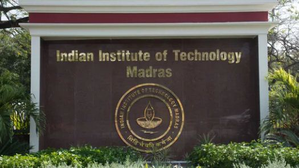New Delhi, March 3 (IANS) IIT Madras researchers have developed a green technology to tackle Antimicrobial Resistance (AMR) in wastewater.
In 2029, bacterial AMR was directly responsible for the deaths of 1.27 million people globally. World Health Organization (WHO) has said that AMR is one of the top global public health threats.
IIT Madras said that the technology developed is an integrated water and wastewater purification process known as ‘Advanced Oxidation Processes’ (AOPs), which is eco-friendly.
The institute said that the research on developing a technology to tackle AMR was undertaken by Prof Indumathi’s former student Dr. Sasikala Rathnavelu.
It said that presently, the pilot project on the Advanced Oxidation Processes to tackle Antimicrobial resistance (AMR) is being led by Prof. Indumathi Nambi and her Student Ms. Thara M V., PhD scholar.
“The misuse and overuse of antimicrobials in humans, animals and plants are the main drivers in the development of drug-resistant pathogens,” IIT Madras told IANS.
The institution said that the human waste, carrying AMR components, reaches Wastewater Treatment Plants through excreted urine and faeces which contributes to AMR including hospital wastewater and bulk-drug manufacturing effluents, rich in antibiotics, ARB, ARGs, and other pharmaceuticals.
It said that this unique technology eliminates the need for external chemical addition, simplifies handling, and allows seamless retrofitting into existing treatment systems, significantly lowering capital investment.
The IIT said the WHO’s ‘One Health framework’ is increasingly recognised as an effective strategy to manage AMR across humans, animals, plants, and the environment.
“In India, rising antibiotic consumption influenced by seasonality, prescription frequency, availability, and price intensifies antibiotic concentrations in environmental matrices,” the IIT said.
The institute said that the researchers found that less than 45 per cent of Indian hospitals have wastewater treatment facilities, and discharge standards for treated hospital effluent are not stringent.
“Unauthorised discharge into domestic sewer systems contributes to a 95 per cent increase in resistant bacteria in Wastewater Treatment Plants, with only 20-30 per cent of sewage being treated in India, and 83 per cent is discharged after secondary treatment,” it said.
Prof Indumathi M Nambi said a recent study conducted by our team along the 18-km stretch of Adyar River, spanning from upstream to within Chennai City, provides crucial insights into water quality and AMR dynamics during both dry and wet seasons.
“Employing advanced molecular techniques such as quantitative polymerase chain reaction (qPCR) and Resistomap HT-qPCR, the researchers analysed water and sediment samples for various parameters including Antibiotic Resistance Genes (ARGs),” Nambi told IANS.
He said that, unlike traditional disinfection methods such as chlorine and ozone, this process created by the team of researchers at IIT Madras achieves complete pollutant mineralisation, preventing the generation of toxic by-products.
“It inhibits bacterial regrowth post-disinfection, ensuring irreversible cell damage, a distinction from UV and ozone methods. The technology’s prowess extends to comprehensive removal of emerging pollutants, Antibiotic Resistant Bacteria (ARB), and Antibiotic Resistance Genes, curbing AMR dissemination in the environment,” he said.
–IANS
gcb/dan
Disclaimer
The information contained in this website is for general information purposes only. The information is provided by TodayIndia.news and while we endeavour to keep the information up to date and correct, we make no representations or warranties of any kind, express or implied, about the completeness, accuracy, reliability, suitability or availability with respect to the website or the information, products, services, or related graphics contained on the website for any purpose. Any reliance you place on such information is therefore strictly at your own risk.
In no event will we be liable for any loss or damage including without limitation, indirect or consequential loss or damage, or any loss or damage whatsoever arising from loss of data or profits arising out of, or in connection with, the use of this website.
Through this website you are able to link to other websites which are not under the control of TodayIndia.news We have no control over the nature, content and availability of those sites. The inclusion of any links does not necessarily imply a recommendation or endorse the views expressed within them.
Every effort is made to keep the website up and running smoothly. However, TodayIndia.news takes no responsibility for, and will not be liable for, the website being temporarily unavailable due to technical issues beyond our control.
For any legal details or query please visit original source link given with news or click on Go to Source.
Our translation service aims to offer the most accurate translation possible and we rarely experience any issues with news post. However, as the translation is carried out by third part tool there is a possibility for error to cause the occasional inaccuracy. We therefore require you to accept this disclaimer before confirming any translation news with us.
If you are not willing to accept this disclaimer then we recommend reading news post in its original language.













